On Saturday 2 November 2019, French singer and actress of Armenian descent Marie Laforêt (1939) passed away. After her first appearance in the drama Plein Soleil (René Clément, 1960) opposite Alain Delon, she became very popular and interpreted many roles in the 1960s. As a singer she is best loved for 'Marie douceur, Marie colère', her version of the Rolling Stones hit 'Paint it black'. Marie Laforêt was 80.

French postcard by E.D.U.G., no. 69.
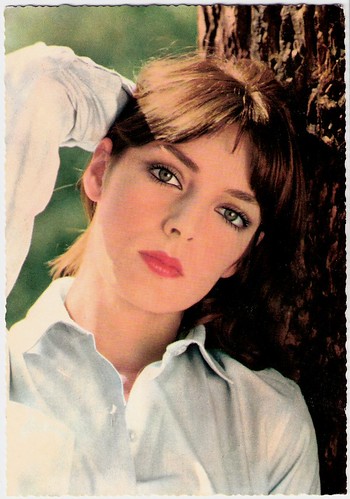
German postcard by Krüger, no. 902/344. Photo: Gérard Decaux.
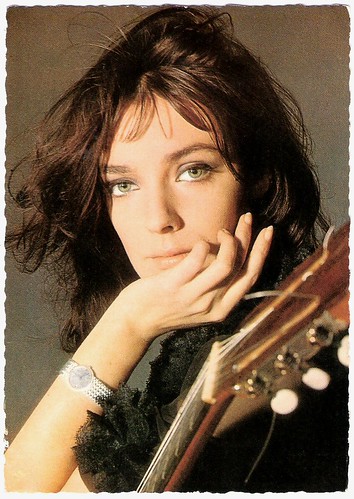
French postcard by PSG, no. 931. Photo: P. de Mervellec.

French promotion card by Disques Festival.

Romanian postcard by Casa Filmului Acin.
Marie Laforêt was born Maïténa Doumenach in Soulac-sur-Mer in the Gironde in 1939. Her parents were of Armenian origin. Marie’s career began accidentally in 1959 when she stepped in for her sister at the last minute in the French radio talent contest Naissance d'une étoile (Birth of a Star) - and won.
Director Louis Malle then cast her in the film he was shooting at the time, Liberté (Freedom). The film was eventually abandoned but Marie went on to take the lead female role opposite heartthrob Alain Delon in the classic Plein Soleil/Purple Noon (René Clément, 1960), based on the novel 'The Talented Mr Ripley' by Patricia Highsmith. That same year she married director Jean-Gabriel Albicocco, who cast her later in some of his own works, including La Fille aux Yeux d'Or/The Girl with the Golden Eyes (1961), based on the Honoré de Balzac story. The film title would become her nickname. In her second film, Saint Tropez Blues (Marcel Moussy, 1961), accompanied by a young Jacques Higelin on guitar, she sang the title song. Immediately she started releasing singles.
Her first hit was the chirpy folkish 'Les Vendanges de l'Amour' in 1963. In a translated version, the song also gave Marie a top ten hit in Italy, as 'La vendemmia dell'amore', a year later. She also recorded some rock songs, her most famous being 'Marie-douceur, Marie-colère' (1966), a cracking version of the Rolling Stones hit 'Paint It Black'. Another popular recording was 1965's 'girl-groupish' 'A demain, My Darling', known by English speakers as 'The Sha La La Song' and recorded by Marianne Faithfull on her debut album.
Her later songs offered a more mature, poetic, tender alternative to the light, teenage yé-yé tunes charting in France at the time. Her melodies borrowed more from exotic folk music, especially South American and Eastern European than from contemporary American and British pop acts. Laforêt worked with many important French composers, musicians and lyricists, such as André Popp and Pierre Cour, who provided her with a panoply of colourful, sophisticated orchestral arrangements, featuring dozens of musical instruments and creating a variety of sounds, sometimes almost Medieval, Renaissance or Baroque, other times quite modern and innovative.
Meanwhile she appeared in several French and Italian films, including Leviathan/Dark Journey (Léonard Keigel, 1962) with Louis Jourdan, À cause, à cause d'une femme/Because, Because of a Woman (Michel Deville, 1963) with Jacques Charrier, La chasse à l'homme/Male Hunt (Edouard Molinaro, 1964) opposite Jean-Paul Belmondo, and Le soldatesse/The Camp Followers (Valerio Zurlini, 1965) starring Anna Karina. She also appeared opposite George Hamilton in the American comedy Jack of Diamonds (Don Sharp, 1967).
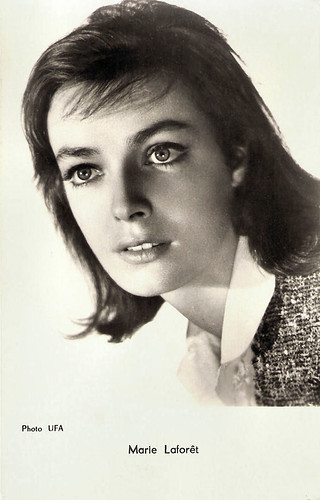
French postcard by Editions P.I., Paris, no. FK 125. Photo: Ufa.
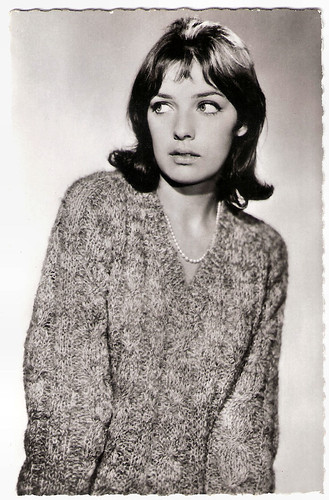
French postcard by Editions du Globe, Paris, no. 871. Photo: Studio Vauclair, Paris.
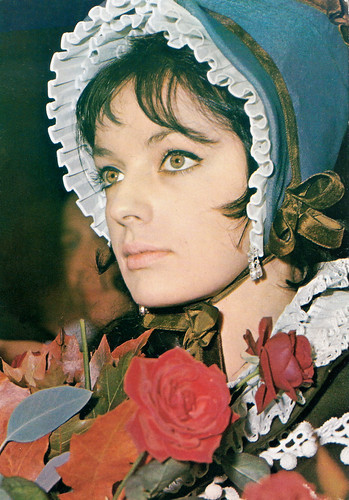
Belgian postcard by Editions Decker, Brussels, no. A 110.
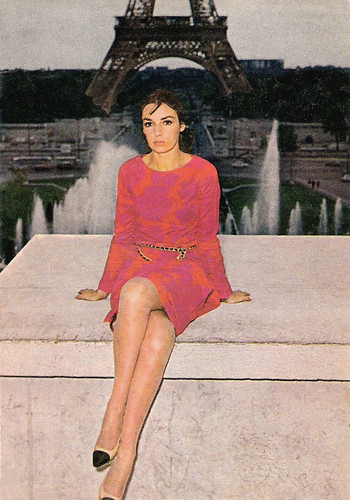
Italian postcard by Diesse / Cristo San Pietro in Corte, Monticello.
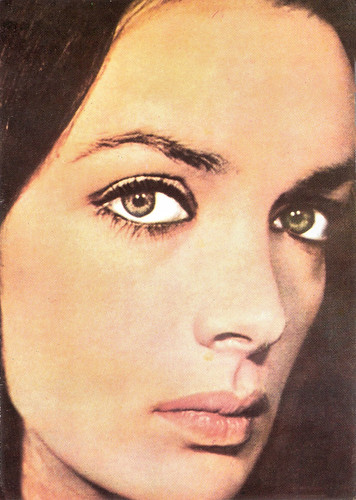
Romanian postcard by Casa Filmului Acin.
At the end of the 1960s, Marie Laforêt became a distinctive figure in the French pop scene. Her music stood out, perhaps too much for her new label CBS Records, which expected more upbeat, simpler songs. Marie fell out with the record company’s bosses over her choice of material, which they felt not to be sufficiently commercial. She was interested in making more personal records but finally gave in. Although her most financially successful singles ('Viens, Viens', a 1973 cover of a British hit, and 'Il a neigé sur Yesterday' (1977), a ballad written by Michel Jourdan about the break-up of The Beatles) were released in the 1970s, Marie progressively lost interest in her singing career.
She moved to Geneva, Switzerland in 1978, where she opened an art gallery and abandoned music more or less altogether. She incidentally appeared in films, including the fairy-tale adaptation Le petit poucet/Tom Thumb (Michel Deville, 1972) and the action comedy Flic ou voyou/Cop or Hood (Georges Lautner, 1979) featuring Jean-Paul Belmondo.
In the 1980s, she concentrated on her acting career, appearing in such French and Italian films as the comedy Les diplômés du dernier rang (Christian Gion, 1982) with Michel Galabru, another Belmondo actioner Les morfalous (Henri Verneuil, 1984) and the little-seen masterpiece Tangos, l'exil de Gardel/Tangos, the Exile of Gardel (Fernando E. Solanas, 1985) dedicated to Carlos Gardel, the legendary Argentinian tango star. She also played regularly on TV, like in the popular mini-series La piovra 3/The Octopus 3 (Luigi Perelli, 1987) starring Michele Placido. Laforêt eventually released some music singles, but they were not popular. She made a comeback, however, in 1993 with an album (her last) for which she wrote the lyrics.
In the 1990s, she again continued to work as an actress, both on stage and on screen in such films as the romance Dis-moi oui.../Say Yes To Me (Alexandre Arcady, 1995) with Jean-Hugues Anglade, and the Sci-Fi film Tykho Moon (Enki Bilal, 1996) with Julie Delpy. She performed in several plays in Paris over the years, acclaimed by audiences and critics alike. In September 2005 she sang once again, going on tour in France for the first time since 1972. Every concert was sold out.
Her last film was the comedy-drama Les bureaux de Dieu/God’s Offices (Claire Simon, 2008) about dedicated social workers who devote their long shifts to helping pregnant women. Marie Laforêt passed away in 2019 in Geneva and had obtained Swiss citizenship. She was the mother of writer-director Liza Azuelos, with whom she worked on the film Ainsi soient-elles/That’s How Women Are (Liza Azuelos, Patrick Alessandrin, 1995) with Vincent Cassel and Thomas Kretschmann.
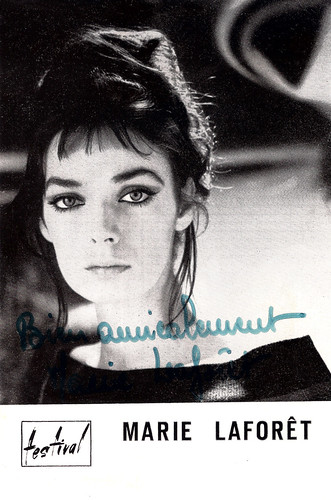
French promotion card by Festival. Photo: Studio du Marais.
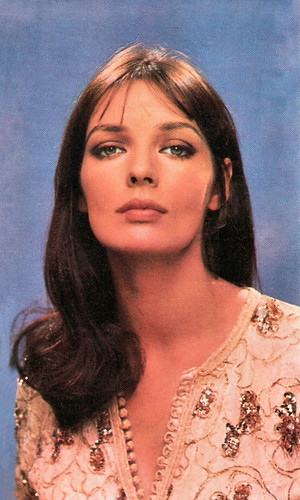
French postcard by PSG, presented by Corvisart, Epinal, no. 474. Photo: Sam Lévin.
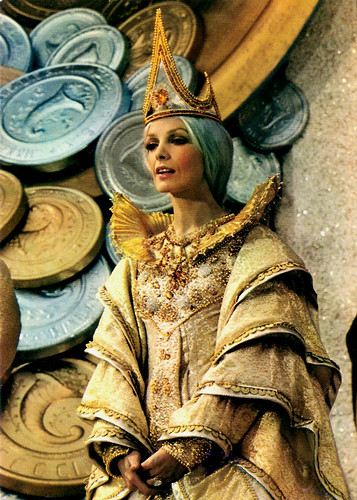
French postcard by Librairie Hachette, Paris, no. 2. Photo: Parc Film Navarre & associes. Publicity still for Le Petit Poucet/Tom Thumb (Michel Boisrond, 1972).
Sources: Ready Steady Girls, Wikipedia and IMDb.
This post was last updated on 6 February 2025.

French postcard by E.D.U.G., no. 69.

German postcard by Krüger, no. 902/344. Photo: Gérard Decaux.

French postcard by PSG, no. 931. Photo: P. de Mervellec.

French promotion card by Disques Festival.

Romanian postcard by Casa Filmului Acin.
The girl with the golden eyes
Marie Laforêt was born Maïténa Doumenach in Soulac-sur-Mer in the Gironde in 1939. Her parents were of Armenian origin. Marie’s career began accidentally in 1959 when she stepped in for her sister at the last minute in the French radio talent contest Naissance d'une étoile (Birth of a Star) - and won.
Director Louis Malle then cast her in the film he was shooting at the time, Liberté (Freedom). The film was eventually abandoned but Marie went on to take the lead female role opposite heartthrob Alain Delon in the classic Plein Soleil/Purple Noon (René Clément, 1960), based on the novel 'The Talented Mr Ripley' by Patricia Highsmith. That same year she married director Jean-Gabriel Albicocco, who cast her later in some of his own works, including La Fille aux Yeux d'Or/The Girl with the Golden Eyes (1961), based on the Honoré de Balzac story. The film title would become her nickname. In her second film, Saint Tropez Blues (Marcel Moussy, 1961), accompanied by a young Jacques Higelin on guitar, she sang the title song. Immediately she started releasing singles.
Her first hit was the chirpy folkish 'Les Vendanges de l'Amour' in 1963. In a translated version, the song also gave Marie a top ten hit in Italy, as 'La vendemmia dell'amore', a year later. She also recorded some rock songs, her most famous being 'Marie-douceur, Marie-colère' (1966), a cracking version of the Rolling Stones hit 'Paint It Black'. Another popular recording was 1965's 'girl-groupish' 'A demain, My Darling', known by English speakers as 'The Sha La La Song' and recorded by Marianne Faithfull on her debut album.
Her later songs offered a more mature, poetic, tender alternative to the light, teenage yé-yé tunes charting in France at the time. Her melodies borrowed more from exotic folk music, especially South American and Eastern European than from contemporary American and British pop acts. Laforêt worked with many important French composers, musicians and lyricists, such as André Popp and Pierre Cour, who provided her with a panoply of colourful, sophisticated orchestral arrangements, featuring dozens of musical instruments and creating a variety of sounds, sometimes almost Medieval, Renaissance or Baroque, other times quite modern and innovative.
Meanwhile she appeared in several French and Italian films, including Leviathan/Dark Journey (Léonard Keigel, 1962) with Louis Jourdan, À cause, à cause d'une femme/Because, Because of a Woman (Michel Deville, 1963) with Jacques Charrier, La chasse à l'homme/Male Hunt (Edouard Molinaro, 1964) opposite Jean-Paul Belmondo, and Le soldatesse/The Camp Followers (Valerio Zurlini, 1965) starring Anna Karina. She also appeared opposite George Hamilton in the American comedy Jack of Diamonds (Don Sharp, 1967).

French postcard by Editions P.I., Paris, no. FK 125. Photo: Ufa.

French postcard by Editions du Globe, Paris, no. 871. Photo: Studio Vauclair, Paris.

Belgian postcard by Editions Decker, Brussels, no. A 110.

Italian postcard by Diesse / Cristo San Pietro in Corte, Monticello.

Romanian postcard by Casa Filmului Acin.
The exile of Carlos Gardel
At the end of the 1960s, Marie Laforêt became a distinctive figure in the French pop scene. Her music stood out, perhaps too much for her new label CBS Records, which expected more upbeat, simpler songs. Marie fell out with the record company’s bosses over her choice of material, which they felt not to be sufficiently commercial. She was interested in making more personal records but finally gave in. Although her most financially successful singles ('Viens, Viens', a 1973 cover of a British hit, and 'Il a neigé sur Yesterday' (1977), a ballad written by Michel Jourdan about the break-up of The Beatles) were released in the 1970s, Marie progressively lost interest in her singing career.
She moved to Geneva, Switzerland in 1978, where she opened an art gallery and abandoned music more or less altogether. She incidentally appeared in films, including the fairy-tale adaptation Le petit poucet/Tom Thumb (Michel Deville, 1972) and the action comedy Flic ou voyou/Cop or Hood (Georges Lautner, 1979) featuring Jean-Paul Belmondo.
In the 1980s, she concentrated on her acting career, appearing in such French and Italian films as the comedy Les diplômés du dernier rang (Christian Gion, 1982) with Michel Galabru, another Belmondo actioner Les morfalous (Henri Verneuil, 1984) and the little-seen masterpiece Tangos, l'exil de Gardel/Tangos, the Exile of Gardel (Fernando E. Solanas, 1985) dedicated to Carlos Gardel, the legendary Argentinian tango star. She also played regularly on TV, like in the popular mini-series La piovra 3/The Octopus 3 (Luigi Perelli, 1987) starring Michele Placido. Laforêt eventually released some music singles, but they were not popular. She made a comeback, however, in 1993 with an album (her last) for which she wrote the lyrics.
In the 1990s, she again continued to work as an actress, both on stage and on screen in such films as the romance Dis-moi oui.../Say Yes To Me (Alexandre Arcady, 1995) with Jean-Hugues Anglade, and the Sci-Fi film Tykho Moon (Enki Bilal, 1996) with Julie Delpy. She performed in several plays in Paris over the years, acclaimed by audiences and critics alike. In September 2005 she sang once again, going on tour in France for the first time since 1972. Every concert was sold out.
Her last film was the comedy-drama Les bureaux de Dieu/God’s Offices (Claire Simon, 2008) about dedicated social workers who devote their long shifts to helping pregnant women. Marie Laforêt passed away in 2019 in Geneva and had obtained Swiss citizenship. She was the mother of writer-director Liza Azuelos, with whom she worked on the film Ainsi soient-elles/That’s How Women Are (Liza Azuelos, Patrick Alessandrin, 1995) with Vincent Cassel and Thomas Kretschmann.

French promotion card by Festival. Photo: Studio du Marais.

French postcard by PSG, presented by Corvisart, Epinal, no. 474. Photo: Sam Lévin.

French postcard by Librairie Hachette, Paris, no. 2. Photo: Parc Film Navarre & associes. Publicity still for Le Petit Poucet/Tom Thumb (Michel Boisrond, 1972).
Sources: Ready Steady Girls, Wikipedia and IMDb.
This post was last updated on 6 February 2025.
4 comments:
I love her in Plein Soleil, the only movie I have seen her in, but have a CD collection of hers, which I like a lot. She is terrific.
She reminds me of someone - Petula Clark?
Could a really expense plastic surgeon give me eyes like her? Alas, probably not. Incredible.
I was unaware that she had such a successful musical career as well.
Post a Comment